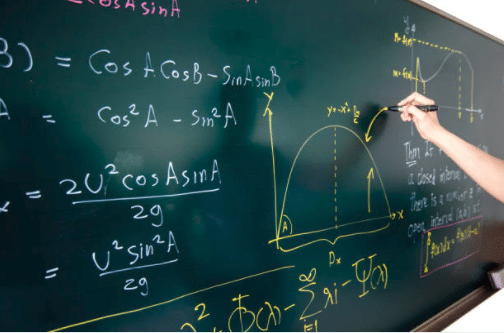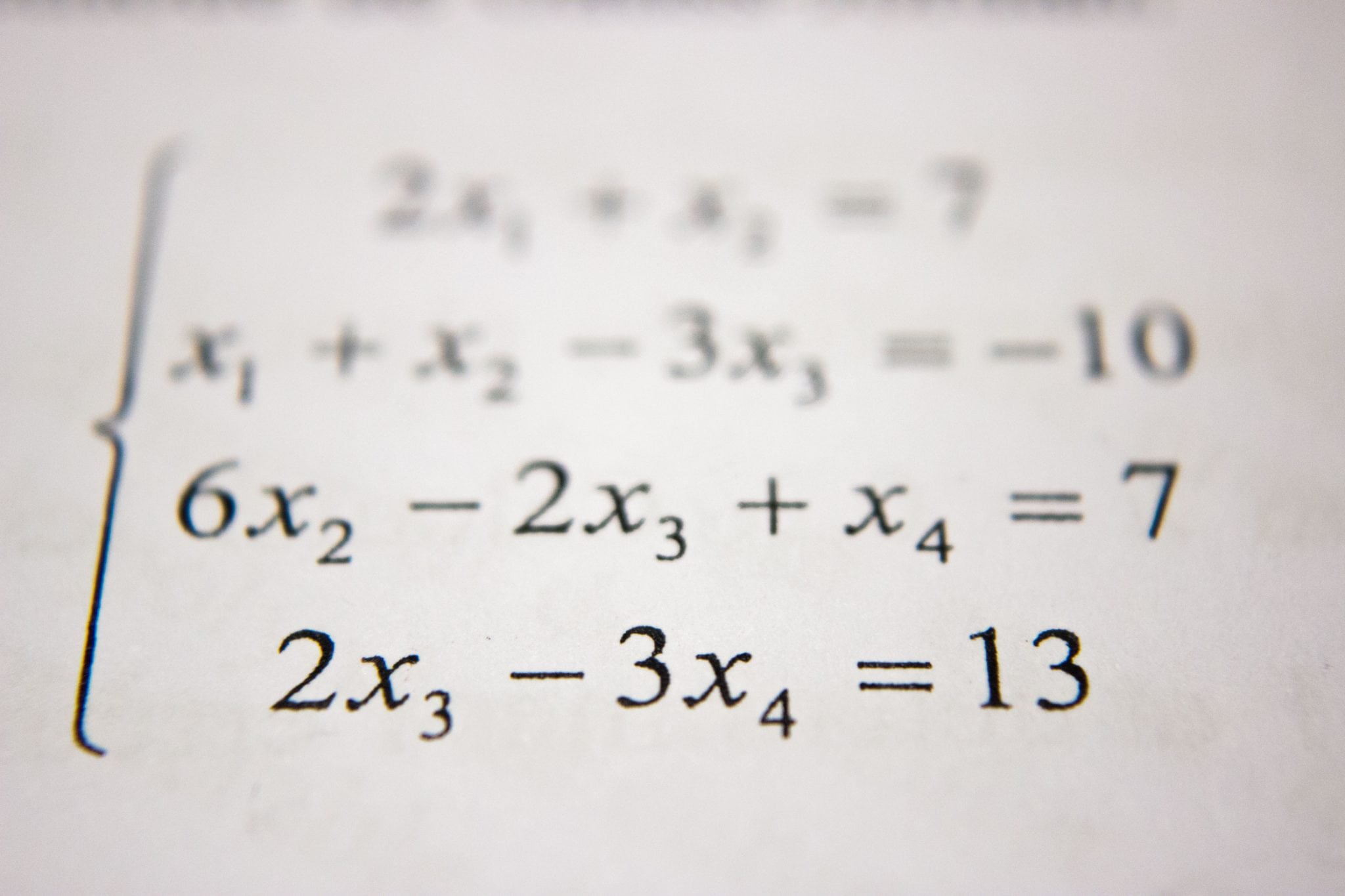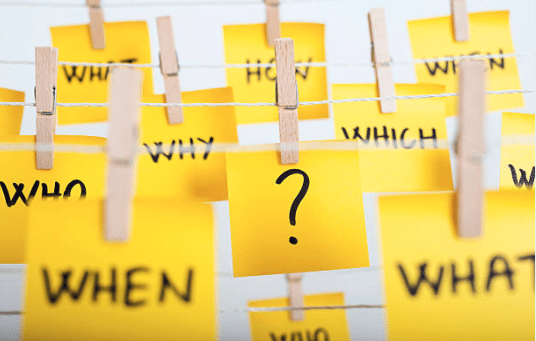Algebra, like other forms of math, is a cognitively challenging exercise that requires both understanding of the fundamentals and consistent practice. Research has shown that our working memory plays a critical role in mathematical cognition. Working memory is distinct from short-term memory, which involves storage of information. Working memory involves both storage and processing. Understanding algebra involves a great deal of process and conceptualization. Mark Ashcroft and Jeremy Kraus claim that “working memory is increasingly involved in problem solving as the numbers in an arithmetic or math problem (the “operands”) grow larger.”
Problem solving is a logical process. Solving algebraic equations involves understanding the rather abstract language of coded symbols, and remembering how numbers function in this system and how they relate to each other. Just like other languages, becoming fluent takes some practical experience and cumulative knowledge.
Ashcroft and Krause argue that working memory is crucial for more complicated forms of math. This means that students must build up that store of computations, expressions, and properties so they can be easily retrieved when a new problem presents itself. They also note that good math students also acquire a capacity for abstract thinking. Algebra problems are expressed with far fewer symbols than complex, multi-clause sentences. Words strung together in sentences usually denote more concrete ideas as well. The abstract nature of algebra is what may make it difficult. The language is not as familiar as other written or spoken languages are.
One of the many benefits of living in our age is that information is much more accessible than it ever was before. One way to clarify the basics of algebra, if the working memory is foggy or the way things were taught felt obscure, is to revisit these basic algebraic concepts, formulas, and properties. Paul’s online math notes provides superb algebra cheat sheets, notes, and tutorials to help refresh your mind and expand the repertoire of knowledge in your working memory. Khan Academy algebra can also help to clarify and exercise your algebraic skills. This free, online algebra help resource offers easy-to-follow and sequential Youtube video tutorials and practice tests that range from a rudimentary understanding of algebraic expressions to more complex forms of logarithms and quadratics. For lingering questions, a one-on-one tutor may really solidify understanding for algebra homework help.
The famous mathematician George Polya, in his book How To Solve It, articulates a helpful model for algebraic problem solving. The simple version goes something like this:
Algebra Help Step 1: Understand the problem.
Polya writes, “It is foolish to answer a question that you do not understand. It is sad to work for an end that you do not desire.” Learn to train your mind to look at each problem and see what it is asking you to solve. If you do not know what the equation asks you to do you will have little hope in finding a viable solution. To get a boost with that in something like how to factor polynomials, it can be helpful to read a tutorial.
Step 2: Devise a plan.
Polya claims that “We have a plan we know, or at least in outline, which calculations, computations, or constructions we have to perform in order to obtain the unknown.” Being well-equipped with an understanding of how to approach a problem involves selecting the best algebraic methods. If you cannot figure out how to solve the overall problem, you may need to divide the problem into smaller sub-goals. This is known as “divide and conquer.”
Step 3: Carry out that plan.
Perform the computations. Conduct the algebraic operations identified in step two. Check each step so to ensure “correctness.” This involves an intuitive and logical sense. If you had a sound plan, this should flow relatively easy. If there are problems, it may be because the plan was not sound. Revise the plan if necessary. In the end, problems should feel resolved and make sense.
Step 4: Look back and reflect on the work.
Serious students of math should not forget this important last step. Although it may seem expedient to simply move to the next problem, Polya claims that “by reconsidering and reexamining the result and the path that led to it” students can consolidate their knowledge and strengthen their problem solving ability.
Algebra commonly fills people with fear. This has been referred to as “math anxiety.” Ashcroft and Krause remark that math anxiety drains the working memory and debilitates cognitive function. It can mentally paralyze some students, leading to poor performance. Often this problem is caused less by a lack of knowledge. Poor results are often simply a result of a cognitive block inspired by fear itself, which Franklin Roosevelt once claimed was the only thing we have to fear. Math anxiety influences cognitive processing by compromising our working memory resources when anxiety stirs.
Regardless of your confidence level, confidence is important; and confidence largely comes from experience and knowledge. It is something that must be built up from the foundation and cultivated through practice. Though the idea is somewhat controversial, many people feel that having a “growth mindset” as opposed to a “fixed mindset” can improve the working memory and overall cognitive performance. Whatever the case, improving knowledge of algebra’s basic processes and computations entails accounting for what you know and then applying this knowledge to diverse problems. A deeper understanding of basic algebraic functions, coupled with a grasp of Polya’s problem solving method, can lead to a certain plasticity within the working memory. This will allow for higher level algebra to become more approachable and feasible.
References
Ashcraft, M., & Krause, J. (2007).Working memory, math performance, and math anxiety.Psychonomic Bulletin & Review, 14(2), 243-248. http://dx.doi.org/10.3758/bf03194059
Campbell, J. (2005). Handbook of mathematical cognition. New York: Psychology Press.
Kaufman, S. (2013). New Cognitive Training Study Takes on the Critics. Scientific American Blog Network. Retrieved 15 August 2017, from https://blogs.scientificamerican.com/beautiful-minds/new-cognitive-training-study-takes-on-the-critics/
Pólya, G. (2004). How to solve it. Princeton, N.J.: Princeton University Press.
Raghubar, K., Barnes, M., & Hecht, S. (2010). Working memory and mathematics: A review of developmental, individual difference, and cognitive approaches. Learning And Individual Differences, 20(2), 110-122. http://dx.doi.org/10.1016/j.lindif.2009.10.005


